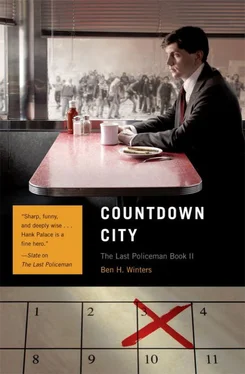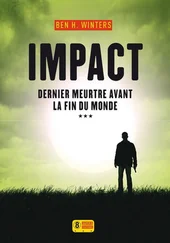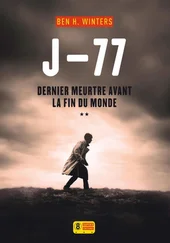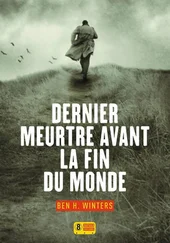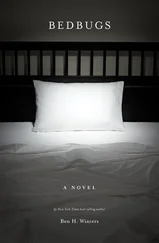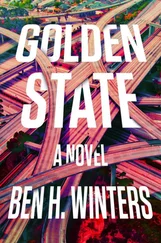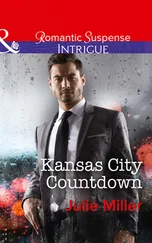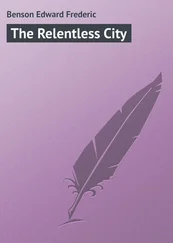I shake my head, trying to shake the sunlight out of my eyes, shake the sweat off my forehead. Figure this out, Palace. Handle this . Then I just start, I start talking:
“Does anyone know where you are and what you’re doing?”
“Julia.”
“Julia thought that someone else knew. She thought someone would try to come and stop you.”
“That was an assumption on her part. She’s wrong. No one knows.”
“Where did you get all the—the blueprints and so on? Of the various bases?”
“From Officer Nils Ryan.”
“Who—”
“A former colleague of mine from Troop F. Also a former chief petty officer in the Coast Guard.”
“But he doesn’t know what you wanted them for?”
“No.”
I don’t need to ask why this man, this Officer Ryan, would turn over such documents: because he asked. Because he’s Brett.
“Okay,” I say. “So no one knows about this. No one knows where you are. Just me and you and Julia.”
“Yes.”
“So let’s—” I look away from his gun barrel, into his eyes. “Brett, let’s end this right now. I do not want to harm you.”
“Then don’t. Go.”
“I won’t. I can’t.”
And then we stand there, my gun pointed at him, his at me.
“Please, Officer.”
“These are human beings with no chance left but one.” Brett, with his soft rumble of a voice, slow train rolling. “Who have risked everything, traveled thousands of miles crammed and sweating in shipping containers and overstuffed holds, and maybe it’s a fool’s chance they’re taking, but that is their right, and they do not deserve to be murdered thirty yards from shore.”
“Yes, but…” But what, Officer Palace? But what? “We were sworn in once, you and I. Right? As officers of the law. We still have an obligation to do what’s lawful and what’s right.”
He shakes his head sadly. “Those two things you said there, friend. Those are two different things.”
I’m standing on a slight rise, looking down at him in his crouch, feeling very tall indeed. A bird flickers past overhead, and then another, and then there’s a wind, stronger than usual, a summer wind carrying up the scent of fish and a pinch of gunpowder from the churning breakers. We can just hear the rushing of the tide, barely reaching us way up here above the cliff face.
“On the count of three,” I say, “we will lower our weapons, both together.”
“Fine,” he says.
“And then we will figure out what to do next.”
“Good.”
“On the count of three.”
“One,” says Brett, and lowers his gun a little bit off his shoulder, and I lower mine an inch or two, my muscles crying out with relief.
“Two,” we say, together now, and now both rifles are at forty-five-degree angles, pointed at the ground.
“Three,” I say, and drop my rifle, and he drops his.
We remain frozen for about a quarter of a second, and both of us start to smile, just a little, two honorable men on a green field, and then Brett is starting to get up and he’s extending his hand and saying “My friend—” and then as I raise my arm there is a sharp bang, a crack in the sky, and my arm explodes in pain, hot and savage, a roaring pain, and I whirl behind me to find the shooter, and by the time I turn back around Brett is on the ground, flattened in the dirt with arms and legs windmilled out in the grass. I leap to him, screaming his name and clutching my arm. I land beside him and lie there panting for five seconds, ten seconds, waiting for more shots. I’m trying to summon up the protocol for victims of gunshot trauma in the field, trying to recall my training regarding rescue breaths and compressions and so on, but it doesn’t matter: The bullet caught Brett dead between the eyes and half the front of his face has been swallowed by a hole. It’s useless—there’s nothing to be done—he’s dead.
* * *
The first thing to do is tourniquet my arm. I know that—that much I remember, and besides it’s obvious, the wound is bleeding like a rushing faucet, great gouts of bright red blood exploding out of my arm, darkening my shirt and coat and puddling between my shoes in the mud and the dirt. Brett’s dead body beside me on the ground.
It’s funny because I’m watching it, this fountain of blood, and it’s happening to someone else, like this is some other man’s arm exploded arm, another man’s torn suit coat and pulsing wound. That one sharp instant of terrible pain I felt at impact has completely receded, and the wound, high on my right arm, at the biceps, is something I can see, and register as severe, but not feel .
This is shock. This absence of feeling is the result of the adrenaline flooding my system, rushing through my veins like seawater crashing the breached holds of a ship. I examine my arm like it’s a joint at the butcher’s counter: a gunshot trauma to the brachial artery, and I’m losing blood quickly, too quickly, precious milliliters gushing out onto the dirt field of Fort Riley. I’ve had general first aid and CPR training and annual continuing education courses per Concord Police Department regulations, and I know what to expect here: blood loss, dizziness, coldness, clamminess, and finally a high risk of fever, high risks all the way around, gunshot wounds in general requiring immediate medical assistance—arterial gunshot wounds in particular. “High risk of loss of limb and/or death.”
I need to stabilize the wound and get to a hospital.
Brett is lying three feet away from me, sprawled out in the dirt. The horrible front-face wound, the stillness of his body. “That contract has been abrogated.” Why did he say that? What does that mean?
Focus, Palace. Tourniquet the wound.
“Okay,” I tell myself. “Geez.”
I scrabble in the dirt and come up with a short thick piece of wood. This is not going to work, not long-term, but I need to staunch the bleeding immediately—I needed to have done it thirty seconds ago—to remain on my feet, get to the bicycle and my first aid kit. I can use my necktie to cinch the wound, for now, but I reach up and my necktie is gone. I slipped it off, just yesterday—was it yesterday?—on the quad at UNH and now it’s lying somewhere along those winding paths like a shed snakeskin in the desert. I extend my left hand, trying as hard as I can to move only that side of my body, don’t jostle the wound; I lean forward and slowly pry off one shoe and then one sock. Wincing, I take the tip of the sock between my teeth and tie it off around my arm like a heroin addict, recalling the shabby gentleman I encountered in the grub tent, the old bearded addict. Here’s to you, sir , I think crazily as I jam the stick between the thin fabric and the flesh of my arm above the wound. I twist the sock tight around the stick and feel a radiating tingle as the blood starts to slow. I look down at the ragged hole in my arm and I can see the spurting of the blood begin to slow, to calm, turning into a bare trickle.
“There we go,” I say to my arm. “There we go.”
It still doesn’t hurt. The shock will wear off somewhere around a half hour from now, and then the pain will set in and intensify steadily over the following six to eight hours. I can see the words on the sea-green stapled booklet we got at EMT-First Responder training in the break room, black Helvetica lettering against the green background of the leaflet: TIME IS OF THE ESSENCE. Stabilize the wound rapidly and keep it stable until the victim can be moved to a hospital.
Hospital, Henry? What hospital?
The sock begins to loosen as soon as I release the grip of my teeth. It’ll last me maybe ten minutes. I stumble to my feet and limp toward the parking lot, toward my Red Rider Wagon full of supplies.
Читать дальше
